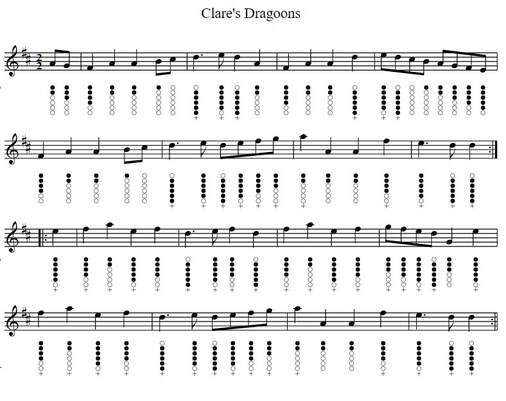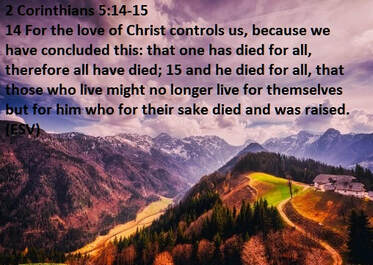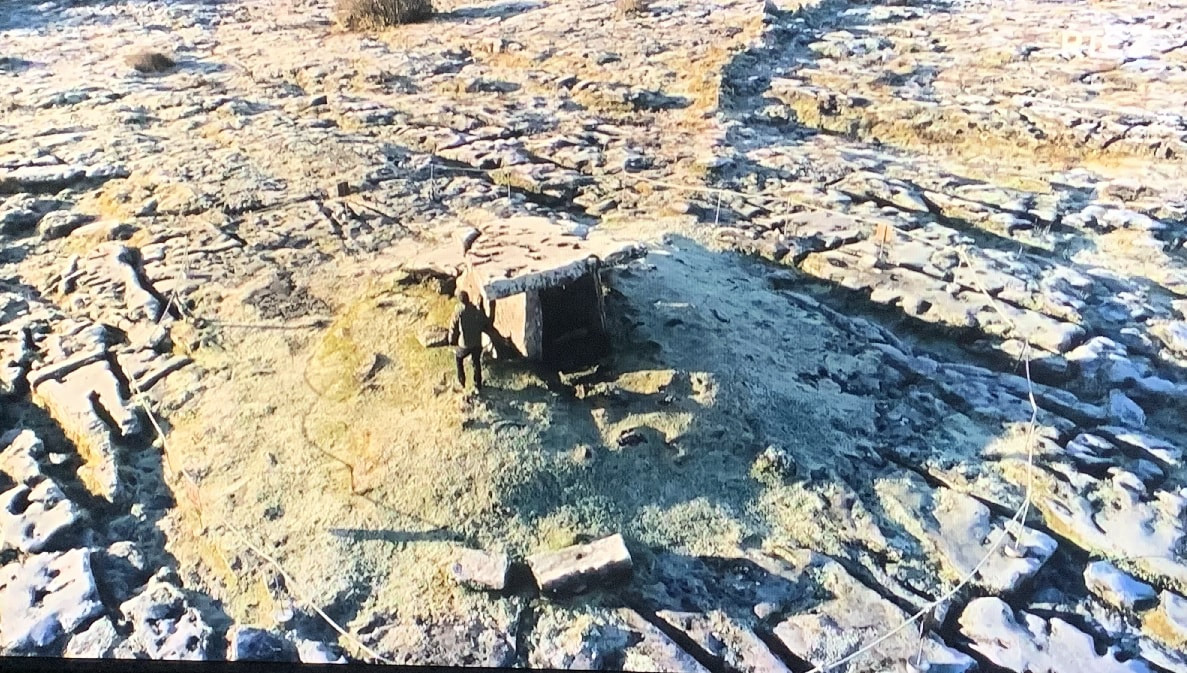CLARE’S DRAGOONS Lyrics And Guitar Chords
4/4 As played by Na Casaidigh (use capo on 4th fret) written by Thomas Davis, the same man who wrote A Nation Once Again. The guitar chords are by Marc Fahrbach. Irish rebel song. The tin whistle sheet music in the key of D is included. There's a whole lot more ballads from Co. Clare here like The Chapel Gates At Cooraclare which is a relatively recent songs when it comes to folk music. A Christy Moore sort of funny song about Lisdoonvarna that was written about the festivals that took place there each year. There's a song that seems to be around even longer than me called My Lovely Rose Of Clare which I always associate with being a Paddy Reilly song, isn't it strange the way some ballads get associated with certain singers ? . There's one by The Fureys called It's A Long Long Way From Clare To Here, but it's not really written about Clare as being about the exploits of a group of Irishmen working in England and blowing all their wages in the pub. And then there's The West Coast Of Clare Song by Andy Irvine which seems to be all about a fella who's broken up with the girlfriend and generally down in the dumps missing her.
Na Casaidigh version
When (D)on Ramillie's (Bm)bloody (D)field,
The baffled French were (G)forced to (Em)yield,
The (D)victor (A)Saxon (Bm)backward (D)reeled
Before the (G)charge of (A)Clare's Dra(D)goons.
The Flags we (A)conquered (Em)in that (D)fray,
Look lone in (A)Ypres' (Em)choir, they (G)say,
We'll (D)win them (A)compan(Em)y to(D)day,
Or bravely (G)die like (A)Clare’s Dra(D)goons.
Chorus:
(D)Viva (A)la for (Bm)Ireland's (D)wrong!
Viva (Bm)la, for (G)Ireland's (Em)right!
(D)Viva (A)la in (Bm)battle (D)throng,
For a Spanish (G)steed, and (A)sabre (D)bright!
The (D)brave old Lord died (Bm)near the (D)fight,
But, for each drop he (G)lost that (Em)night,
A (D)Saxon (A)cava(Bm)lier shall (D)bite
The dust be(G)fore Lord (A)Clare's Dra(D)goons,
For never, (A)when our (Em)spores were (D)set
And never, (A)when our (Em)sabres (G)met,
Could (D)we the (A)Saxon (Em)soldiers (D)get
To stand the (G)shock of (A)Clare's Dra(D)goons.
(D)Viva (A)la, the (Bm)New Bri(D)gade!
Viva (Bm)la, the (G)Old One, (Em)too!
(D)Viva (A)la, the (Bm)rose shall (D)fade,
And the shamrock (G)shine for(A)ever (D)new!
An(D)other Clare is (Bm)here to (D)lead,
The worthy son of (G)such a (Em)breed;
The (D)French ex(A)pect some (Bm)famous (D)deed,
When Clare leads (G)on his (A)bold Dra(D)goons.
Our Colonel (A)comes from (Em)Brians (D)race,
His wounds are (A)in his (Em)breast and (G)face,
The (D)bearna (A)baoghail is (Em)still his (D)place,
The foremost (G)of his (A)bold Dra(D)goons.
Repeat 2nd chorus twice.
Back to the Irish Lyrics And Chords From C-F
When (D)on Ramillie's (Bm)bloody (D)field,
The baffled French were (G)forced to (Em)yield,
The (D)victor (A)Saxon (Bm)backward (D)reeled
Before the (G)charge of (A)Clare's Dra(D)goons.
The Flags we (A)conquered (Em)in that (D)fray,
Look lone in (A)Ypres' (Em)choir, they (G)say,
We'll (D)win them (A)compan(Em)y to(D)day,
Or bravely (G)die like (A)Clare’s Dra(D)goons.
Chorus:
(D)Viva (A)la for (Bm)Ireland's (D)wrong!
Viva (Bm)la, for (G)Ireland's (Em)right!
(D)Viva (A)la in (Bm)battle (D)throng,
For a Spanish (G)steed, and (A)sabre (D)bright!
The (D)brave old Lord died (Bm)near the (D)fight,
But, for each drop he (G)lost that (Em)night,
A (D)Saxon (A)cava(Bm)lier shall (D)bite
The dust be(G)fore Lord (A)Clare's Dra(D)goons,
For never, (A)when our (Em)spores were (D)set
And never, (A)when our (Em)sabres (G)met,
Could (D)we the (A)Saxon (Em)soldiers (D)get
To stand the (G)shock of (A)Clare's Dra(D)goons.
(D)Viva (A)la, the (Bm)New Bri(D)gade!
Viva (Bm)la, the (G)Old One, (Em)too!
(D)Viva (A)la, the (Bm)rose shall (D)fade,
And the shamrock (G)shine for(A)ever (D)new!
An(D)other Clare is (Bm)here to (D)lead,
The worthy son of (G)such a (Em)breed;
The (D)French ex(A)pect some (Bm)famous (D)deed,
When Clare leads (G)on his (A)bold Dra(D)goons.
Our Colonel (A)comes from (Em)Brians (D)race,
His wounds are (A)in his (Em)breast and (G)face,
The (D)bearna (A)baoghail is (Em)still his (D)place,
The foremost (G)of his (A)bold Dra(D)goons.
Repeat 2nd chorus twice.
Back to the Irish Lyrics And Chords From C-F




